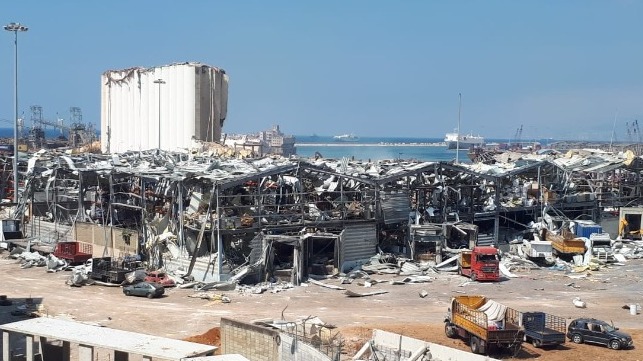FBI Joins Investigation Into Explosion at Port of Beirut

The FBI will be joining in the investigation into the circumstances of the giant blast at the Port of Beirut on August 4, which leveled most of the central port and damaged buildings up to a mile away.
"The FBI will soon join Lebanese and international investigators at the invitation of the Lebanese in order to help answer questions that I know everyone has about the circumstances that led up to this explosion," U.S. Under Secretary for Political Affairs David Hale said during a visit to Beirut on Thursday.
A recent U.S. intelligence assessment suggests that the blast was an accident, according to the Wall Street Journal - if a foreseeable and preventable one. Port workers and Lebanese security officials have conveyed a similar view: the consensus account suggests that the blast was set off by a team of welders who were tasked with making a cache of explosives more secure.
The designated terrorist organization Hezbollah has a "dominant but murky role" at the Port of Beirut, as it does in many Lebanese institutions, according to Brookings Institution fellow Jeffrey Feltman. That role - which the Iran-backed group denies - has given rise to extensive speculation about the underlying cause of the disaster.
Hezbollah's decisionmaking role has also drawn intense criticism from many of the protesters on Beirut's streets, who achieved the resignation of the government earlier this week. Hezbollah holds considerable power in Lebanese politics, and it is widely viewed as a proxy for Tehran's interests in the region - and as an obstacle to political change.
In a conversation with Iranian President Hassan Rouhani on Wednesday, French President Emmanuel Macron - who has emerged as the leader of the foreign aid effort in Lebanon - warned that Iran should not interfere in the country's affairs. In a readout published by his office, Macron warned Rouhani that it is a "necessity for all the powers concerned . . . to avoid any outside interference and to support the putting in place of a government which can manage the emergency."
Port reopens
Operations at the Port of Beirut's container terminal resumed on Monday and are now "back to normal," French container carrier CMA CGM wrote in a customer advisory Thursday.
"Damages to Beirut terminal being less serious than what could be expected after the tragic events that took place on August 4, a first CMA CGM vessel Nicolas Delmas has been operated with success on Monday," the carrier said. "With immediate effect, all CMA CGM lines will resume their calls at Beirut port according to their normal schedules, and our intermodal services will be fully ensured in the country."
The port's grain terminal was at the epicenter of the blast, and the silo - containing the majority of the nation's grain supply - was badly damaged. One vessel carrying grain docked at a different terminal at the Port of Beirut on Monday, according to state media, allaying concerns that Lebanon could experience a wheat shortage. The UN World Food Programme has pledged to send Lebanon an additional 50,000 tonnes of wheat, enough for a three month supply. The first 17,500 tonne cargo is expected to arrive towards the end of next week. WFP is also providing mobile grain storage systems to temporarily replace the destroyed silos.
Two vessels sank alongside the pier at the port after the blast. A cruise ship across the basin to the east was badly damaged and capsized the day after the explosion, and a second vessel with the appearance of a livestock carrier took on a worsening list and capsized directly adjacent to the blast site several days later.
